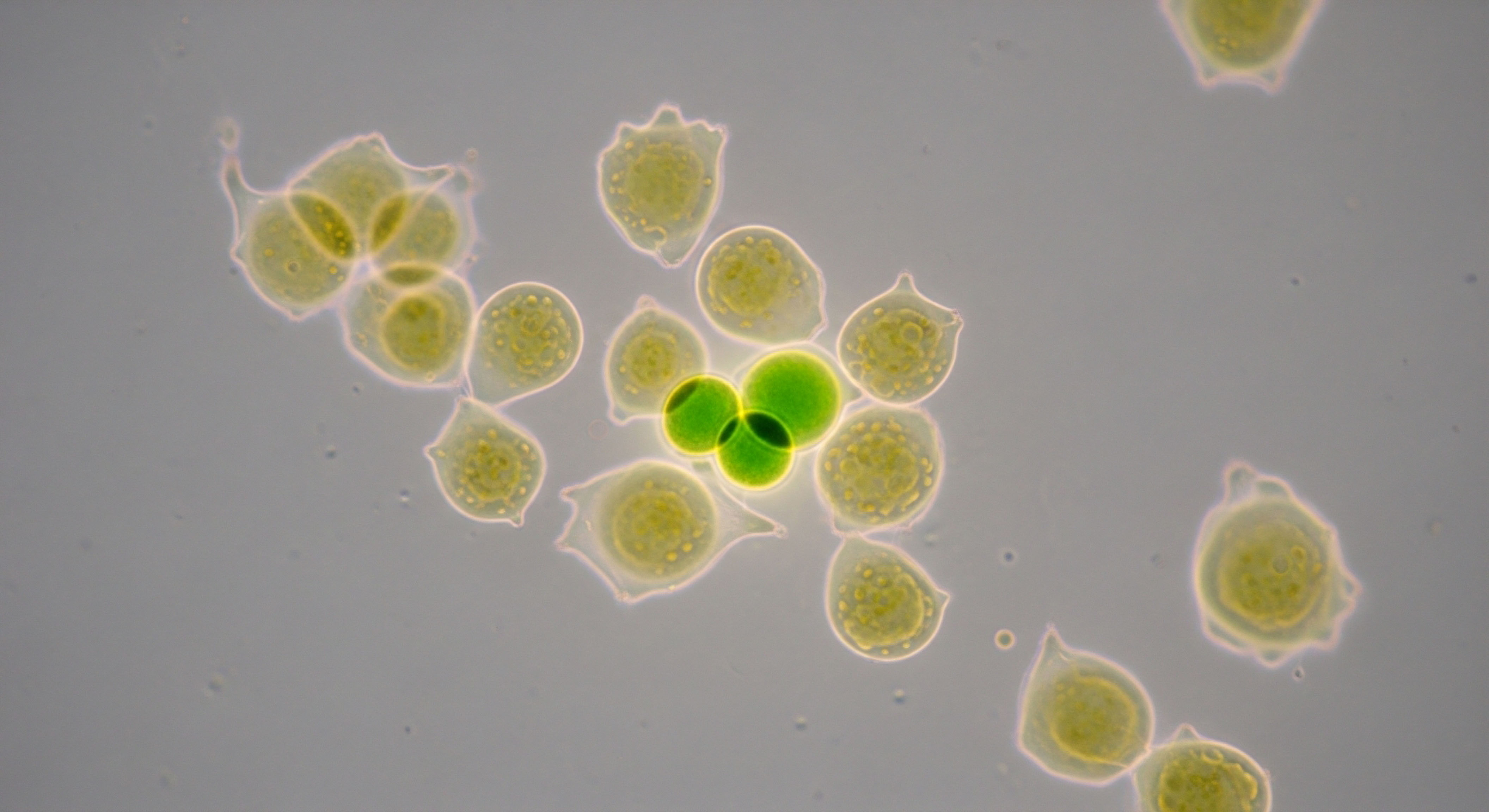

Biological Foundation Peak State
The body operates as a sophisticated, interconnected system, a biological marvel engineered for peak performance. Deep rest constitutes a critical, active phase of systemic recalibration and renewal, transcending mere absence of activity. It is the fundamental pillar upon which optimal function, resilience, and true self-actualization are built.
Neglecting this phase is akin to expecting a high-performance engine to run at its limit without essential maintenance and refueling. The consequences manifest as diminished capacity, accelerated decline, and a muted expression of one’s inherent potential.
At its core, deep rest orchestrates the intricate hormonal symphony that governs virtually every physiological process. During deep sleep stages, the body initiates critical endocrine events. Growth hormone, essential for tissue repair, muscle synthesis, and metabolic regulation, is released in pulsatile bursts.
This hormone is a primary architect of cellular regeneration, ensuring that tissues damaged by daily stressors are meticulously rebuilt and strengthened. Testosterone, a key mediator of vitality, mood, and physical prowess in both sexes, also sees its restorative synthesis significantly influenced by adequate sleep. Disruptions to sleep patterns directly impair the hypothalamic-pituitary-gonadal (HPG) axis, leading to suboptimal hormone levels that diminish drive, energy, and physical composition.

Hormonal Equilibrium Performance Unleashed
The delicate balance of hormones is paramount for sustained vitality. Cortisol, the body’s primary stress hormone, is tightly regulated by the circadian rhythm. Optimal rest allows for the natural diurnal fluctuation of cortisol, with levels typically peaking in the morning and declining throughout the day.
Chronic sleep deprivation, however, leads to elevated baseline cortisol, a state that promotes catabolism (tissue breakdown), impairs immune function, fosters fat accumulation, and contributes to cognitive fog. Deep rest, conversely, supports the downregulation of the stress response, allowing the body to shift from a state of perpetual alert to one of anabolic repair and recovery. This hormonal recalibration is not just about managing stress; it is about creating the internal biochemical environment necessary for growth, learning, and peak physical output.

Cognitive Clarity Deep Renewal
The brain, the command center of this biological system, undergoes a profound cleansing and consolidation process during rest. The glymphatic system, a brain-wide waste clearance pathway, becomes highly active during sleep, flushing out metabolic byproducts, including neurotoxic proteins like beta-amyloid, which are implicated in neurodegenerative diseases.
This nocturnal detoxification is vital for maintaining cognitive acuity, memory consolidation, and efficient neural signaling. Furthermore, sleep is critical for synaptic plasticity ∞ the ability of neural connections to strengthen or weaken over time, which is the basis of learning and memory. Without sufficient, high-quality rest, cognitive functions such as attention, executive function, problem-solving, and emotional regulation are significantly compromised, dulling the sharpness required to navigate complex challenges and express one’s full intellectual capacity.
The link between deep rest and metabolic health is equally compelling. Sleep deprivation disrupts glucose metabolism, leading to insulin resistance and an increased risk of type 2 diabetes. It also affects the hormones that regulate appetite, ghrelin and leptin, leading to increased cravings for calorie-dense foods and a greater propensity for weight gain.
By optimizing rest, one recalibrates these metabolic signals, fostering greater insulin sensitivity and supporting a healthy body composition. This creates a metabolic foundation that fuels sustained energy and physical resilience.
Adequate sleep supports the release of growth hormone, essential for tissue repair and metabolic regulation, by up to 70% in deep sleep stages.


Physiological Symphony Restoration
The restorative processes that occur during deep rest are not passive occurrences but dynamic, highly orchestrated biological events. They represent the body’s intrinsic engineering for self-maintenance and enhancement, operating with precision across multiple physiological domains. Understanding these mechanisms illuminates the significant impact of rest on our capacity for peak performance and enduring vitality.

Deep Sleep the Anabolic Phase
The architecture of sleep itself is a carefully designed sequence of cycles, each serving distinct restorative functions. The Non-Rapid Eye Movement (NREM) stages, particularly slow-wave sleep (Stage 3), are the bedrock of physical regeneration. During this phase, the body conserves energy while initiating critical anabolic processes.
This is the primary window for the pulsatile release of Human Growth Hormone (HGH). HGH is a master regulator of cellular repair, tissue regeneration, and metabolic function. It signals cells to increase protein synthesis, build muscle mass, and repair cellular damage accumulated throughout the day. This hormonal cascade ensures that tissues, from muscle fibers to connective tissues, are meticulously mended and strengthened, preparing the body for subsequent demands.

REM Sleep Cognitive Architecture
Rapid Eye Movement (REM) sleep, characterized by increased brain activity and vivid dreaming, is equally indispensable, though its primary contributions lie in cognitive and emotional processing. This phase is critical for consolidating memories, processing emotional experiences, and enhancing learning and problem-solving abilities.
The brain actively replays and reorganizes neural pathways, strengthening important connections and pruning less relevant ones. This neurological ‘housekeeping’ ensures optimal synaptic function, leading to enhanced creativity, improved focus, and greater emotional resilience. Without adequate REM sleep, cognitive functions become impaired, affecting decision-making, learning capacity, and mood stability.

Neurochemical Recalibration and Waste Management
Beyond hormonal and synaptic remodeling, deep rest is fundamental for restoring neurochemical balance. Neurotransmitters like dopamine, serotonin, and norepinephrine, which govern mood, motivation, focus, and reward pathways, are replenished during sleep. This replenishment is vital for maintaining optimal mental states and preventing the emotional dysregulation and motivational deficits associated with sleep deprivation.
Concurrently, the brain’s glymphatic system operates at peak efficiency during deep sleep. This system acts as a biological plumbing network, clearing metabolic waste products and neurotoxins that accumulate in the brain during waking hours. This clearance is paramount for preventing the buildup of harmful proteins associated with cognitive decline and neurodegenerative conditions.
The impact extends to metabolic regulation. Sleep influences the body’s sensitivity to insulin, affecting how efficiently glucose is utilized for energy. It also regulates the appetite-signaling hormones ghrelin and leptin. Insufficient rest leads to increased ghrelin (hunger hormone) and decreased leptin (satiety hormone), driving increased food intake and a preference for energy-dense foods. Optimized sleep patterns, conversely, restore hormonal balance, supporting metabolic flexibility and aiding in the maintenance of a healthy body composition.
Consider the intricate interplay ∞
- Slow-Wave Sleep (NREM Stage 3): Facilitates Growth Hormone release, muscle repair, and physical regeneration.
- REM Sleep: Critical for memory consolidation, emotional processing, and enhanced cognitive function.
- Glymphatic System Activity: Clears neurotoxins and metabolic waste from the brain.
- Neurotransmitter Replenishment: Restores balance for mood, focus, and motivation.
- Hormonal Regulation: Optimizes cortisol, testosterone, and appetite-regulating hormones.
The glymphatic system’s waste clearance function during sleep can be up to 10 times more active than during waking hours.


Circadian Mastery Performance Cycle
The efficacy of deep rest is intrinsically tied to its timing and alignment with the body’s natural biological rhythms. Mastering these temporal patterns, primarily dictated by the circadian system, unlocks the full spectrum of rest’s restorative power and its contribution to peak performance. Irregularity in timing, or a misalignment between our internal clock and external environment, fundamentally compromises the restorative process.

The Circadian Imperative
Our internal ~24-hour clock, the circadian rhythm, dictates the timing of sleep, hormone release, body temperature, and countless other physiological functions. This system is primarily synchronized by light exposure. Optimal rest requires adherence to this natural rhythm, aligning sleep and wakefulness with the body’s predisposed cycles.
Exposure to bright light, particularly blue light from electronic devices, in the hours leading up to bedtime suppresses melatonin production, a key hormone for sleep initiation. Conversely, early morning light exposure helps anchor the circadian clock, signaling the body to be alert and awake. Consistent adherence to a regular sleep-wake schedule, even on weekends, is paramount for maintaining robust circadian function and maximizing the restorative benefits of sleep.

Sleep Architecture and Cycle Timing
Throughout the night, sleep progresses through distinct cycles, each comprising NREM and REM stages. These cycles typically last between 90 to 110 minutes and repeat multiple times. The distribution of these stages shifts over the night; the early part of sleep is dominated by deep NREM sleep, while the later portion sees a greater proportion of REM sleep.
Therefore, achieving a full 7-9 hours of sleep ensures sufficient time in each critical sleep stage. Fragmented sleep or prematurely waking disrupts the natural progression of these cycles, diminishing the cumulative benefits of both deep physical restoration and cognitive processing.

Chronotype Synchronization and Strategic Recovery
Individual variations in circadian timing, known as chronotypes, influence our natural inclination towards morning or evening activity. Understanding one’s chronotype allows for a more personalized approach to optimizing sleep and wake times. For instance, a “night owl” may find it more challenging to align with an early morning schedule, and vice versa for an “early bird.” Working with, rather than against, one’s chronotype, where feasible, can significantly improve sleep quality and overall daily energy levels.
Strategic application of rest also includes judicious use of naps. Short, well-timed naps (20-30 minutes) can serve as powerful tools for cognitive enhancement and recovery during the day, provided they do not interfere with nighttime sleep architecture. A mid-afternoon nap, for example, can help mitigate the natural dip in alertness that occurs in the early afternoon, improving focus and productivity for the remainder of the day.

Practices for Circadian Alignment
- Maintain a consistent sleep-wake schedule daily.
- Optimize bedroom environment for darkness, quiet, and cool temperature.
- Seek natural light exposure shortly after waking.
- Limit blue light exposure from screens in the 2-3 hours before bedtime.
- Avoid heavy meals, caffeine, and alcohol close to bedtime.
- Incorporate mindful wind-down routines to signal the body for rest.
Individuals whose sleep-wake cycles are consistently misaligned with their environment show a 30% higher risk of metabolic syndrome.

Your Highest Biological Expression
The integration of deep rest into your life is not merely about managing fatigue; it is about engineering a superior state of being. It is the strategic pause that enables unparalleled forward momentum. By respecting and optimizing your body’s innate restorative processes, you are not just recovering from exertion; you are actively building a more resilient, capable, and vibrant self.
This deliberate commitment to deep renewal fuels cognitive precision, hormonal balance, and metabolic efficiency ∞ the foundational elements of peak human performance and sustained vitality.
Embracing deep rest is a declaration of intent ∞ to operate at the zenith of your biological potential. It is the silent, yet powerful, engine driving clarity, energy, and optimal function. This disciplined approach to recovery is the unseen advantage, the master key that unlocks your most capable and authentic self, allowing you to express your full spectrum of abilities with unparalleled grace and power.

Glossary

deep rest

growth hormone

deep sleep

circadian rhythm

glymphatic system

metabolic health

cellular repair

rem sleep

hormonal balance

light exposure




